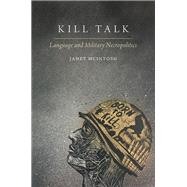Kill Talk Language and Military Necropolitics
, by McIntosh, Janet- ISBN: 9780197808023 | 0197808026
- Cover: Paperback
- Copyright: 5/14/2025
The language used by American military personnel can be intense and confrontational, yet the relationship between language and military violence is rarely examined in depth. This groundbreaking book offers a unique perspective on how language facilitates the work of combat infantry-the state's killable killers. Through vivid ethnographic research, Janet McIntosh meticulously traces the nuances of military “kill talk” as it permeates the vast nervous system of the military, from the first exposure to yelling in Marine Corps basic training to the dark humor and nihilistic expressions found in war zones in Vietnam and the Middle East. McIntosh reveals how military trainers use language to deindividuate, toughen, and masculinize recruits, while infantry soldiers develop distinct linguistic repertoires and attitudes to suppress empathy, dehumanize and racialize the enemy, cope with loss, and dwell in a moral gray zone.
Kill Talk also addresses national debates over language use in a diverse world, exploring tensions between calls for sensitivity and restraint in military speech and the perception that these can threaten national security. The book highlights the contradictions between the rhetoric of military honor and moral integrity and the harsh, sometimes depraved, language of combatants, suggesting that these paradoxes enable military violence yet contribute to moral injury. It concludes with an exploration of veteran poets and artists who have found innovative ways to use language and other forms of expression to critique military institutions and begin the process of demilitarizing their psyches.
Kill Talk also addresses national debates over language use in a diverse world, exploring tensions between calls for sensitivity and restraint in military speech and the perception that these can threaten national security. The book highlights the contradictions between the rhetoric of military honor and moral integrity and the harsh, sometimes depraved, language of combatants, suggesting that these paradoxes enable military violence yet contribute to moral injury. It concludes with an exploration of veteran poets and artists who have found innovative ways to use language and other forms of expression to critique military institutions and begin the process of demilitarizing their psyches.






